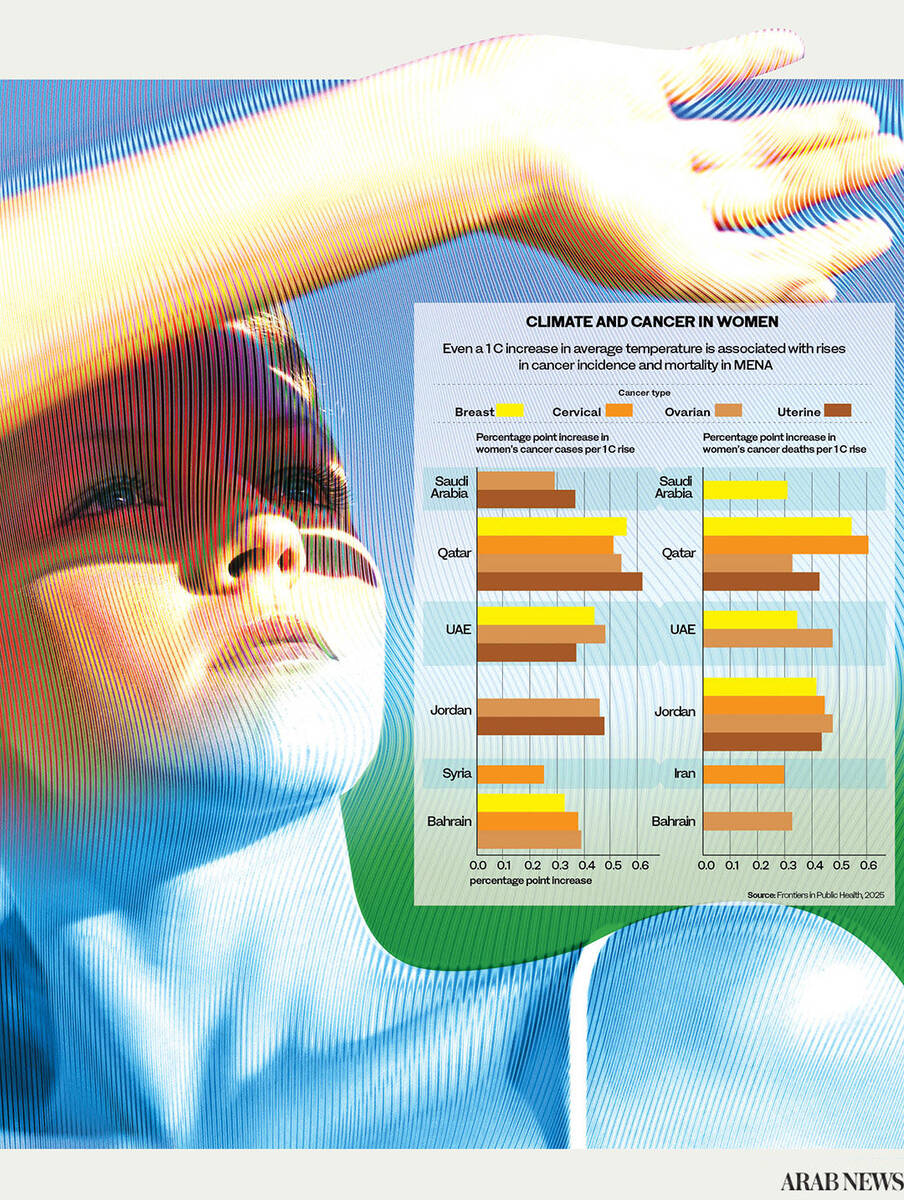
L 
A study says the connection between rising temperatures and increasing cases of the four types of cancer was found to be significant in six Mideastern countries. (NurPhoto via Getty Images)Next
Short Url
https://arab.news/gddzs. Updated 19 July 2025 JONATHAN GORNALL
- Researchers link rising temperatures to higher cancer rates and urge deeper study of climate-health risks facing women regionwide
- New evidence suggests climate change may be worsening cancer outcomes for women, prompting calls for urgent regional response
LONDON: Researchers at the American University in Cairo have identified a disturbing link between rising temperatures and increases in cases of breast, cervical, ovarian and uterine cancers among women in the Middle East and North Africa region.
The key message of a study that has identified “a significant correlation between prolonged exposure to high ambient temperatures and all four cancer types” is as simple as it is urgent, said Wafa Abu El-Kheir-Mataria, senior researcher at the Institute of Global Health and Human Ecology at the American University in Cairo.
“Our findings make it clear that climate change is not a distant or abstract threat. It is already impacting women’s health in tangible ways,” said Dr. Kheir-Mataria, co-author with Prof. Sungsoo Chun, associate director of the institute, of a new paper published in the journal Frontiers in Public Health.
“In the MENA region, rising temperatures are significantly correlated with increased prevalence and mortality of several cancers affecting women.”

She added: “This evidence highlights the urgent need to integrate climate risks into cancer control strategies today, not tomorrow.”
The study looked at 17 countries in the MENA region and examined how increasing average temperatures coincided with how often women were getting certain cancers and dying from them.
The connection between rising temperatures and increasing cases of the four types of cancer was found to be significant in just six countries — Qatar, Bahrain, Saudi Arabia, the UAE, Syria and Jordan.
The finding that the four wealthy Gulf states featured significantly was a “very important observation,” said Dr. Kheir-Mataria, and one that merits urgent further investigation.

“The Gulf countries have some of the strongest healthcare systems in the region,” she said.
“However, what our findings may reflect is that even high-performing systems are now facing new, complex challenges brought about by climate change — challenges that may not yet be fully addressed within traditional cancer control strategies.”
The Gulf states, she added, “are also among those experiencing the most extreme and rapid increases in temperature, which can amplify environmental exposures that are not always visible or easily managed, such as air pollution or heat-related physiological stress.”
At the same time, “social and behavioral factors, like health-seeking behaviors or cultural barriers to early screening, may continue to influence outcomes despite strong system capacity.”
DID YOU KNOW?
• Breast, ovarian, uterine and cervical cancers are rising in parts of MENA as temperatures increase year on year.
• Even Gulf countries with strong health systems show above-average increases in cancer deaths linked to climate stress.
• Researchers say a 4 C rise by 2050 could amplify health risks, but more local studies are urgently needed.
Dr Kheir-Mataria wants “more in-depth, country-specific research in countries such as Qatar, Bahrain, Saudi Arabia, and the UAE. Our study is an important starting point, but it has clear limitations. We worked with publicly available data and focused primarily on the relationship between temperature and cancer outcomes, while controlling for income.
“However, many other important factors such as air pollution levels, urban heat islands, occupational exposure, genetic predispositions, and healthcare utilization patterns were beyond the scope of this analysis.”
To fully understand all the factors at play, “we need access to more granular data and the opportunity to examine these additional variables in context.

“That’s why we are actively seeking local partnerships with research institutions, ministries of health, and environmental agencies and funding to support collaborative studies.”
The Gulf states, she said, “are uniquely positioned to lead the way in advancing global understanding of climate-related health risks, and we would be honored to work together to generate evidence that informs national policy and protects women’s health in the face of climate change.”
Meanwhile, it is necessary to “acknowledge that environmental stressors such as rising temperatures and air pollution can exacerbate cancer risks, particularly for vulnerable groups such as women, and incorporate climate change adaptation into cancer control plans.”
Adaptation strategies “might include strengthening early detection and screening services in high-risk areas, ensuring healthcare facilities remain accessible during climate-related disruptions, and integrating environmental risk monitoring into public health planning.”

Dr Kheir-Mataria said this “involves cross-sectoral collaboration between health, environmental, and planning ministries to build climate resilient healthcare systems.”
The study combined two decades of data from the Institute of Health Metrics and Evaluation’s Global Burden of Disease with statistics on temperature change from the FAOSTAT Climate Change database of the UN’s Food and Agriculture Organization, for every year from 1998 to 2019.
Applying a method of statistical analysis called multiple linear regression, which adjusted results to take account of socioeconomic differences between countries that might influence health outcomes, the researchers were able to identify “a clear pattern: where temperatures rose, cancer rates and deaths often rose too.”
